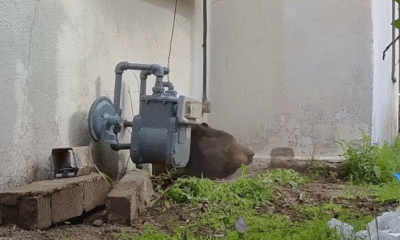Health
Gender surgeries, migraine tips, 'Zika-like' virus and more top health stories

Fox News Digital publishes an array of health pieces all week long to keep you in the know on key wellness topics: disease prevention, nutrition, medical research, health care and more. Personal stories of people and families overcoming great health obstacles are also published.
Check out some of the top stories of the week in Health that you may have missed or have been meaning to check out.
These are just a few of what’s new. There are many more to see at Fox News Health.
CLICK HERE TO SIGN UP FOR OUR HEALTH NEWSLETTER
Here are eight stories worth knowing.
1. Breast removal surgery performed on girls under age 12
Since 2017, hundreds of females age 12 and younger with gender dysmorphia have undergone double mastectomies, according to analysis released by the Manhattan Institute this week — and that number may be considerably higher. The risks of this “drastic intervention” are noted by experts. Click here to get the story.
Psychologists point out the mental health consequences of certain types of surgery on young women. (iStock)
2. Top 10 causes of death in US
The Centers for Disease Control and Prevention has released the primary killers in the country. Find out where heart disease, cancer and COVID fall on the list. Click here to get the story.
Heart disease was once again the top cause of death in 2023. (iStock)
3. ‘Zika-like’ virus spreads into Europe
The Oropouche virus is transmitted through bites by mosquitoes and midges, with sloths and birds acting as hosts. Check out symptoms, treatment and prevention tips. Click here to get the story.
As of the end of July, 19 cases of the Oropouche virus had been reported in Europe, with 12 in Spain, five in Italy and two in Germany, per reports. (iStock)
4. Avoiding tragedy on the water
Alcohol was involved in 17% of boating fatalities, according to new data from the U.S. Coast Guard. Experts reveal tips on preventing these tragedies. Click here to get the story.
Alcohol is known to cause impaired judgment, balance, coordination and reaction time — all of which can put boat operators and their passengers at risk for accidents and fatalities. (iStock)
5. Screen time limits benefit kids
Kids who had only a certain number of hours of screen time each week showed improvements in mental health, communication and behavioral difficulties. Click here to get the story.
In 2023, the U.S. Surgeon General released an advisory related to social media use among youth, emphasizing mental health concerns. (iStock)
6. What to do when a migraine hits
A doctor notes the most important steps to take to reduce headache pain and curb anxiety about the condition. Click here to get the story.
One out of every seven people around the world suffers from migraines, statistics show. (iStock)
7. Lance Bass announces Type 1.5 diabetes diagnosis
Here’s what to know about the condition, which is often mistaken for type 2 diabetes, experts say. Click here to get the story.
Pop singer Lance Bass recently shared on social media that he has type 1.5 diabetes, also known as latent autoimmune diabetes in adults (LADA). (Getty Images)
8. Chiropractic cure for colic in babies?
An Ohio couple claims that chiropractic adjustments “transformed” their fussy infant. Doctors weigh in on the potential benefits and risks of performing the treatment on babies. Click here to get the story.
This week’s top health stories included risky surgeries, a little-known type of diabetes, a viral outbreak and migraine control tips. (iStock)

Health
The Best Time To Take ‘Nature’s Ozempic’ Berberine for Weight Loss and Blood Sugar Control, According to an MD

Use left and right arrow keys to navigate between menu items.
Use escape to exit the menu.
Sign Up
Create a free account to access exclusive content, play games, solve puzzles, test your pop-culture knowledge and receive special offers.
Already have an account? Login
Health
Study reveals why chewing gum might actually help with focus and stress relief

NEWYou can now listen to Fox News articles!
Humans have been chewing gum for thousands of years, long after the flavor fades and without any clear nutritional benefit.
The habit dates back at least 8,000 years to Scandinavia, where people chewed birchbark pitch to soften it into a glue for tools. Other ancient cultures, including the Greeks, Native Americans and the Maya, also chewed tree resins for pleasure or soothing effects, National Geographic recently reported.
In the late 19th and early 20th centuries, William Wrigley Jr. transformed chewing gum from a novelty into a mass consumer habit through relentless and innovative marketing. His brands, including Juicy Fruit and Spearmint, promoted gum as a way to calm nerves, curb hunger and stay focused.
COMMON DENTAL HEALTH ISSUE MAY HINT AT MORE DANGEROUS MEDICAL CONDITION
“Are you worried? Chew gum,” an article from 1916 said, according to Kerry Segrave’s book, “Chewing Gum in America, 1850-1920: The Rise of an Industry.” “Do you lie awake at night? Chew gum,” it continued. “Are you depressed? Is the world against you? Chew gum.”
Advertisements have long framed chewing gum as a tool for stress relief and mental sharpness. (Keystone View Company/FPG/Archive Photos/Getty Images)
In the 1940s, a study found chewing resulted in lower tension but couldn’t say why.
“The gum-chewer relaxes and gets more work done,” The New York Times wrote at the time about the study’s results.
Gum became an early form of wellness, and companies are trying to revive that idea today as gum sales decline, according to National Geographic.
GARLIC EXTRACT RIVALS TRADITIONAL MOUTHWASH FOR DENTAL HYGIENE IN SURPRISING NEW REVIEW
But only now are scientists finally beginning to understand the biology behind those long-standing beliefs.
Chewing gum may briefly affect attention and stress-related brain activity, according to studies. (iStock)
A 2025 review by researchers at the University of Szczecin in Poland analyzed more than three decades of brain-imaging studies to examine what happens inside the brain when people chew gum. Using MRI, EEG and near-infrared spectroscopy research, the authors found that chewing alters brain activity in regions tied to movement, attention and stress regulation.
The findings help clarify why the seemingly pointless task can feel calming or focusing, even once the flavor has faded.
CLICK HERE TO SIGN UP FOR OUR HEALTH NEWSLETTER
Chewing gum activated not only the brain’s motor and sensory networks involved in chewing, but also higher-order regions linked to attention, alertness and emotional control, the review found. EEG studies found brief shifts in brain-wave patterns linked to heightened alertness and what researchers call “relaxed concentration.”
Humans have chewed gum for pleasure for thousands of years, according to reports. (iStock)
“If you’re doing a fairly boring task for a long time, chewing seems to be able to help with concentration,” Crystal Haskell-Ramsay, a professor of biological psychology at Northumbria University, told National Geographic.
The review also supports earlier findings that gum chewing can ease stress, but only in certain situations. In laboratory experiments, people who chewed gum during mildly stressful tasks such as public speaking or mental math often reported lower anxiety levels than those who didn’t.
CLICK HERE FOR MORE HEALTH STORIES
Chewing gum did not, however, consistently reduce anxiety in high-stress medical situations, such as immediately before surgery, and it offered no clear benefit when participants faced unsolvable problems designed to induce frustration.
Some studies suggest chewing gum can reduce stress in mild situations but not extreme ones. (iStock)
Across multiple studies, people who chewed gum did not remember lists of words or stories better than those who didn’t, the researchers also found, and any boost in attention faded soon after chewing stopped.
Gum may simply feed the desire to fidget, experts suspect.
TEST YOURSELF WITH OUR LATEST LIFESTYLE QUIZ
“Although these effects are often short-lived, the range of outcomes … underscores chewing gum’s capacity to modulate brain function beyond simple oral motor control,” the researchers wrote.
“However, at this time, the neural changes associated with gum chewing cannot be directly linked to the positive behavioral and functional outcomes observed in studies,” they added.
A 2025 review analyzed decades of MRI, EEG and near-infrared spectroscopy studies on gum chewing. (iStock)
Future research should address longer-term impacts, isolate flavor or stress variables and explore potential therapeutic applications, the scientists said.
CLICK HERE TO DOWNLOAD THE FOX NEWS APP
The findings also come with caveats beyond brain science. Although sugar-free gum may help reduce cavities, Fox News Digital has previously reported that dentists warn acids, sweeteners and excessive chewing may harm teeth or trigger other side effects.
Fox News Digital has reached out to the study’s authors for comment.
Health
The Best Time To Take Turmeric for Weight Loss and How To Maximize Results

Use left and right arrow keys to navigate between menu items.
Use escape to exit the menu.
Sign Up
Create a free account to access exclusive content, play games, solve puzzles, test your pop-culture knowledge and receive special offers.
Already have an account? Login
-

 Detroit, MI1 week ago
Detroit, MI1 week ago2 hospitalized after shooting on Lodge Freeway in Detroit
-

 Technology5 days ago
Technology5 days agoPower bank feature creep is out of control
-

 Dallas, TX3 days ago
Dallas, TX3 days agoAnti-ICE protest outside Dallas City Hall follows deadly shooting in Minneapolis
-

 Dallas, TX6 days ago
Dallas, TX6 days agoDefensive coordinator candidates who could improve Cowboys’ brutal secondary in 2026
-

 Delaware2 days ago
Delaware2 days agoMERR responds to dead humpback whale washed up near Bethany Beach
-

 Iowa5 days ago
Iowa5 days agoPat McAfee praises Audi Crooks, plays hype song for Iowa State star
-

 Health1 week ago
Health1 week agoViral New Year reset routine is helping people adopt healthier habits
-

 Nebraska4 days ago
Nebraska4 days agoOregon State LB transfer Dexter Foster commits to Nebraska


















